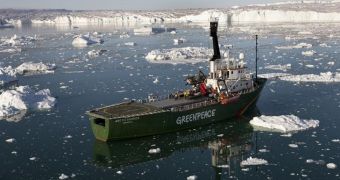Greenpeace's Arctic 30 are back in the spotlight. This time, it's not because Russia has decided to go after them, but because they have decided to go after Russia.
On its website, Greenpeace says that, this March 17, it launched a case at the European Court of Human Rights on behalf of the Arctic 30.
The goal is to twist Russia's arm into compensating the environmentalists for their two-month imprisonment, and to have the Court rule that Russian authorities had no business arresting the Greenpeace members and supporters.
As reported, the Arctic 30 were arrested back in September 2013, in the aftermath of a protest against oil and gas giant Gazprom and its plans to drill in the Arctic.
This protest boiled down to the fact that two environmentalists boarded an oil platform belonging to said company, and refused to leave on their own accord.
These activists, together with other members and supporters of the organization that were aboard The Arctic Sunrise, were eventually taken into police custody, and charged first with piracy, and then with hooliganism.
It took several weeks for the charges filed against them to be dropped, but, towards the end of 2013, the Arctic 30 were all finally freed and allowed to return to their homes.
Greenpeace maintains that the protest these environmentalists took part in was a peaceful one and that, by arresting them and keeping them imprisoned for two months, Russia violated several human rights.
It is expected that the European Court of Human Rights force the country into admitting guilt, and compensating the activists for the abuses they suffered.
“The 30 individuals are requesting ‘just compensation’ from the Russian Federation, and importantly, a statement from the independent Court saying that their apprehension in international waters by Russian agents and subsequent detention were unlawful,” Greenpeace writes on its website.
“The Arctic 30 are not criminals. They are peaceful protesters, journalists and environmental human rights defenders,” the organization goes on to say.
According to Greenpeace, Russia first went wrong when, during the protest, state agents threw ropes at Greenpeace inflatables, and hit some of the activists. Besides, it claims that the very same state agents used guns and knives to threaten the environmentalists.
The organization further says that, when The Arctic Sunrise was raided, the activists were held at gunpoint, locked in their cabins or other premises, and detained without charge for over five days.
Besides, they were not allowed to use any communication devices or do anything that they wanted unless explicitly given permissions by the agents monitoring them.
Lastly, the Arctic 30 were forced to spend several weeks behind bars despite the fact that they had done nothing wrong and should not have been arrested, to begin with.
For the time being, Russia has not made any comments on the case launched by Greenpeace at the European Court of Human Rights.

 14 DAY TRIAL //
14 DAY TRIAL //